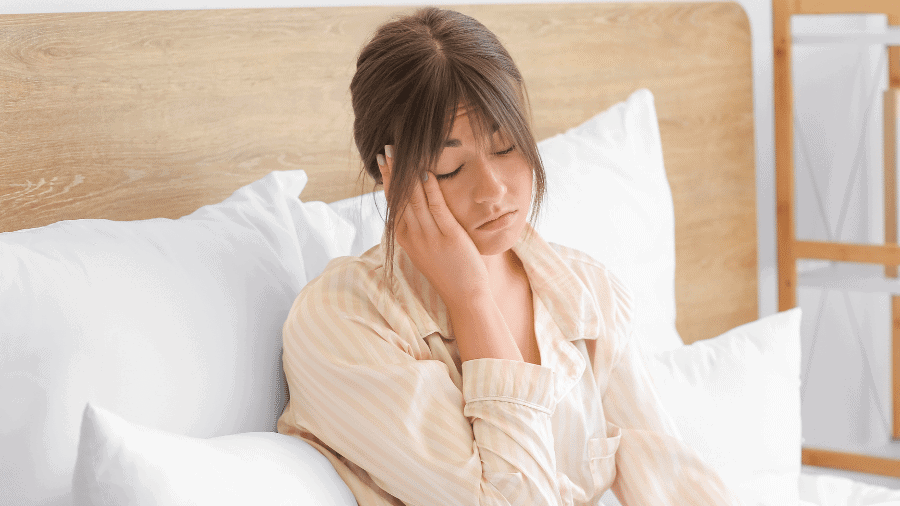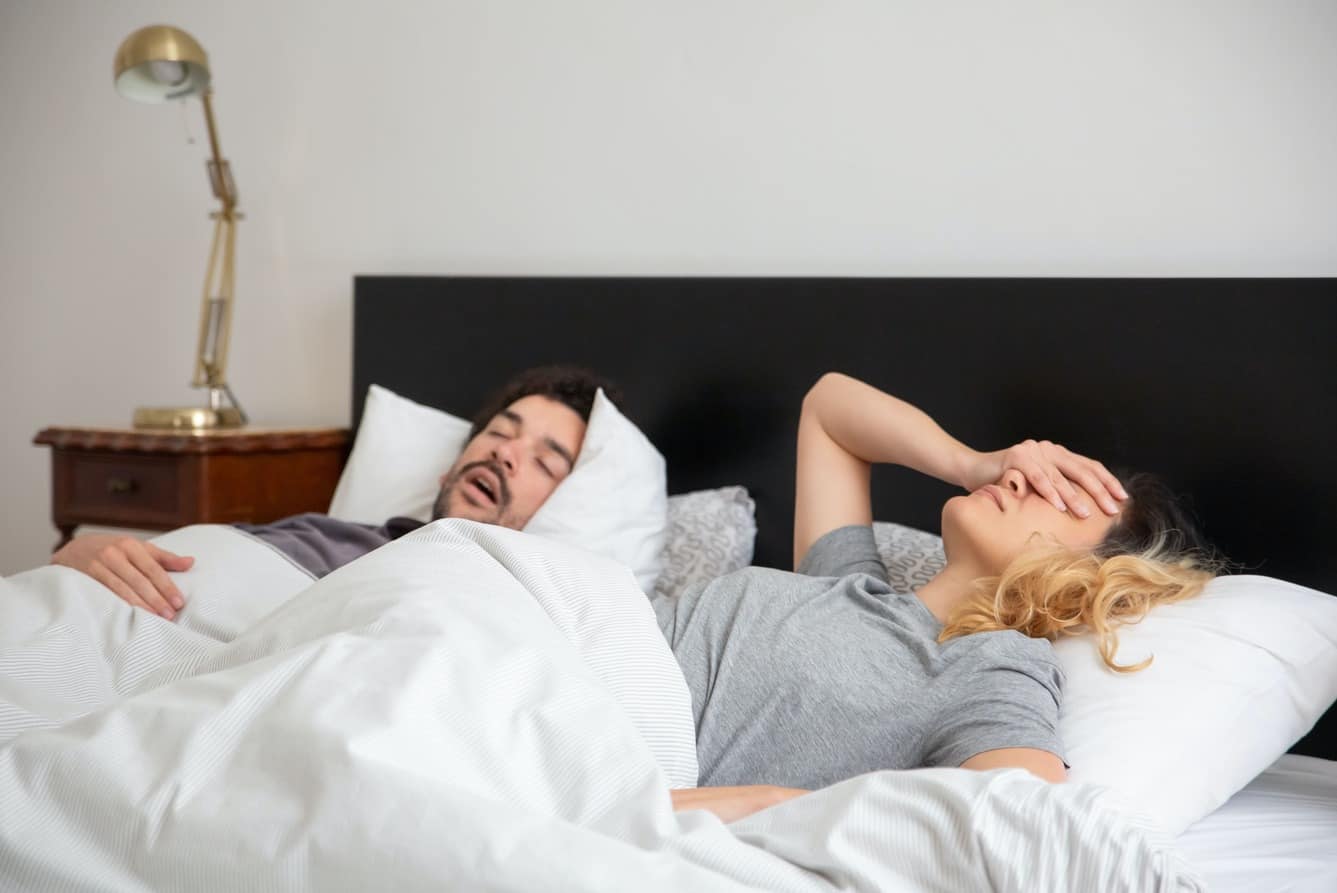
It is no surprise that anxiety disorders within North America have become the most common mental illness in the US, affecting 40 million adults in the US aged 18 and older. Could a sleep disorder be partly to blame?
Sleep and Mental Health
Anxiety disorders are highly treatable, yet very few who suffer from mental health disorders seek out medical attention. This is about 75% of people with mental health disorders going without treatment in developed countries.
As per the Anxiety and Depression Association of America, 1 in 13 globally suffer from anxiety, and it is common for those with an anxiety disorder to also suffer from depressive disorders and vice versa.
Sleep, sleep disorders, and mental health are complex subjects affected by various factors and triggers. Yet, many are related and have common symptoms, and studies have shown and proven that improving sleep can have a beneficial impact on mental health and can also be the key component to treating many psychiatric disorders.
Sleep complements traditional ways and practices of treating mental health disorders. Some mental health practices which can aid in the reduction of anxiety and depression disorders are:
- Frequent exercise
- Eating nutritional whole foods, such as veggies and fruits
- Reducing daily stress by finding healthy coping mechanisms
- A proper night’s sleep.
Some mental health disorders we know today are:
- Panic Disorder (PD)
- Social Anxiety
- Stress
- Obsessive-Compulsive Disorder (OCD)
- Post-traumatic stress disorder (PTSD)
- Major depression Disorder
(If you or someone you know is struggling with any mental health disorders, speak to your doctor or seek medical attention from a healthcare professional.)
What Is Sleep Apnea?
Sleep apnea, which is considered a sleep disorder, causes you to stop breathing during your sleep. Repeated lapses (stops or pauses) in breathing can last up to 10 seconds or longer with a drop in oxygen level by 3% or more.
The human brain causes arousal to wake the individual up due to the lack of oxygen circulating around the body and back to the brain. These short bouts of arousal can be brief, and most individuals are not aware that this is happening to them during their sleep.
This arousal causes a break in the individual’s sleep cycle, causing fragmented sleep stages (longer non-REM sleep and short REM cycles). Short sleep interruptions during the night can lead to excessive tiredness during the day and disrupt the natural sleep schedule.
Fragmented sleep can contribute to insomnia, sleep deprivation, daytime sleepiness, cardiac health problems, and several other consequences that have a large negative impact on our mental health.
Fragmented sleep due to sleep apnea can cause or aggravate existing mental health conditions, such as depression and anxiety. Most people suffering from these disorders don’t seek out treatment for sleep apnea and become susceptible to underlying health issues and comorbidities.
Some symptoms of sleep apnea include the following:
- Loud snoring or gasping and choking
- Daytime fatigue and tiredness
- Type II diabetes
- Cardiac health issues (stroke, high blood pressure, MI, AFIB)
- Chronic Obstructive Pulmonary Disease (COPD)
- Poor memory and concentration
(Ensure to speak to your Dr. or a healthcare professional to see if you should be tested for sleep apnea.)
Sleep, Sleep Apnea, and Mental Health Disorders
Studies over the years have shown a direct correlation between poor sleep, sleep apnea, and mental health disorders. As research continues on this subject, some evidence suggests that treating sleep apnea and getting a proper night’s sleep are so important for our mental health.
There must be a reason why we use the phrase “woke up on the wrong side of the bed” to suggest someone is in a bad mood. Now the common question is, does sleep apnea cause mental health disorders, such as anxiety, or do mental health disorders cause sleep apnea?
These are so closely related in symptoms that there are no definite answers. Doctors suggest that testing for sleep disorders and then treating the discovered sleep disorder first may be the answer prior to starting any kind of medication.
Brain Science behind Sleep Apnea and Mental Disorders
During sleep, our brain fluctuates between different sleep stages, creating cycles of REM and non-REM (NREM) sleep. Adults require four cycles of continuing non-REM and REM sleep. Each cycle can take 90-120 minutes to complete, averaging the total sleep time for adults at 8 hours.
Each stage of sleep plays a vital role in our overall brain health. Uncontrollable breathing problems during sleep apnea can cause severe anxiety, and the anxiety in turn can make sleeping or sleep problems worse. Since sleep deprivation can contribute to both anxiety and depression, a vicious cycle can often develop for those with sleep apnea.
Let’s break this down. During sleep, the brain stores new information and releases toxic waste. Nerve cells communicate and recognize, which supports healthy brain function.
The body repairs cells restore energy, and releases certain molecules, such as hormones and proteins, during periods of non-REM and REM sleep. Five of the most common hormones released during our sleep cycles are:
- Melatonin, which aids and promotes sleep
- Growth hormones, which support bone and muscle development as well as metabolism
- Cortisol, which is part of the body’s stress response system
- Leptin and ghrelin, assist and control appetite.
These waves of sleep stages increase our capacity for better thinking, memory storage, and learning. These five hormones are so common in our day-to-day life in making us feel physically, but most importantly, mentally better.
During sleep, our brain can also generate and regulate emotional brain function. Adequate sleep, especially REM sleep (dream sleep), aids in processing emotional information and helping remember thoughts and events.
Did you know that studies have shown that while an individual sleeps if he refuses to confront negative emotions while awake, the brain works on dealing with these negative emotions without him during sleep, commonly done during REM sleep.
Studies have shown that during REM sleep, the amygdala (part of the brain), is more active than during NREM. Amygdala is an integrative center for emotions, emotional behavior, and motivation.
Ever wake up feeling unmotivated to get to work or just felt like you woke up grumpy? Well, chances are it is because you didn’t get enough REM sleep for your Amygdala to fully activate and provide you with the emotional support to help you throughout the day.
Individuals with a lack of REM sleep, which is mostly observed in patients who suffer from sleep apnea, often lack the ability to release positive emotional content. This can be both harmful and frustrating to the individual and can lead to mental health problems and neurodevelopmental disorders.
Studies done by the National Center for Biotechnology Information have shown that Obstructive Sleep Apnea (OSA), a subtype of sleep apnea, is mostly found in patients who suffer from psychiatric conditions.
This may undermine their physical health and heighten their risk of serious mental distress. Psychotic disorders are severe mental health disorders that cause abnormal thinking and perceptions. People with psychosis lose touch with reality. Two of the main symptoms to look out for are delusions and hallucinations.
Some types of psychotic disorders we know today are:
- Schizophrenia (most common)
- Schizoaffective Disorder
- Schizophreniform Disorder
- Brief Psychotic Disorder
- Delusional Disorder
- Paraphrenia
(If you or someone you know is struggling with an untreated psychotic disorder, please speak to a doctor or seek medical attention from a healthcare professional.)
In Conclusion
Over the years, society has changed, and so have our lifestyles. It has become more difficult to obtain the necessary amount of sleep an adult human body requires to properly function throughout the day.
Between dropping off the kids at school, working a 9-5 or attending school, taking the kids to practice, getting ourselves to the gym, washing up and cleaning up, and catching up with friends and family, we are left with little to no time for ourselves; so when do we sleep?
We must remember that the human body has made little to no changes since the beginning of time, so just like before and more than ever, sleep is crucial to our bodies. Ensure that you work off a schedule that does not leave you burnt out.
Follow a realistic day planner or schedule that works for everyone in the household and check in with yourself to maintain a healthy lifestyle. Ensure to incorporate stress-free time slots for yourself daily to relax and encourage healthy coping mechanisms for those daily stresses.
Going for short walks outside, meditation, reading something you enjoy, dancing, singing, and maybe just taking a nap can do the trick to decrease stress and promote a feel-good attitude.
Speaking up about mental health allows for a more positive outcome for you and your loved ones. Great medical help and resources are out there to assist you with making the right and healthier choices for you and your mental health needs.
I’ve learned to remind myself daily that “If it cannot be done today, then that is why we have tomorrow; and if tomorrow does not come, then I have worried for no reason.”
By Ashley – Certified Polysomnographic Technologist





